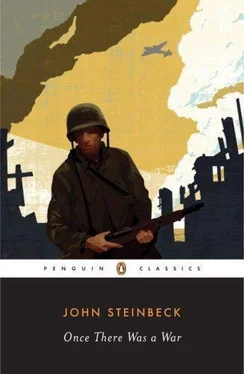John Steinbeck - Once there was a war
Здесь есть возможность читать онлайн «John Steinbeck - Once there was a war» весь текст электронной книги совершенно бесплатно (целиком полную версию без сокращений). В некоторых случаях можно слушать аудио, скачать через торрент в формате fb2 и присутствует краткое содержание. Город: New York, Год выпуска: 1960, Издательство: Bantam Books, Жанр: Классическая проза, на английском языке. Описание произведения, (предисловие) а так же отзывы посетителей доступны на портале библиотеки ЛибКат.
- Название:Once there was a war
- Автор:
- Издательство:Bantam Books
- Жанр:
- Год:1960
- Город:New York
- ISBN:нет данных
- Рейтинг книги:3 / 5. Голосов: 1
-
Избранное:Добавить в избранное
- Отзывы:
-
Ваша оценка:
- 60
- 1
- 2
- 3
- 4
- 5
Once there was a war: краткое содержание, описание и аннотация
Предлагаем к чтению аннотацию, описание, краткое содержание или предисловие (зависит от того, что написал сам автор книги «Once there was a war»). Если вы не нашли необходимую информацию о книге — напишите в комментариях, мы постараемся отыскать её.
Once there was a war — читать онлайн бесплатно полную книгу (весь текст) целиком
Ниже представлен текст книги, разбитый по страницам. Система сохранения места последней прочитанной страницы, позволяет с удобством читать онлайн бесплатно книгу «Once there was a war», без необходимости каждый раз заново искать на чём Вы остановились. Поставьте закладку, и сможете в любой момент перейти на страницу, на которой закончили чтение.
Интервал:
Закладка:
Now the enemy knew what was going on. They had to know. The operation was too great for them not to know. They sent their planes over the harbor to try to bomb the gathering fleets and they were driven off and destroyed by the protecting Beaufighters and P-38s. They did not succeed in doing damage, for finally the enemy had lost control of the skies and the fleets could load at least in peace.
But at night they tried to get through and the flak rose up at them, like all the Fourth of Julys in history, the ships and the shore batteries put up a wall of fire against the invading planes so that some of them unloaded their bombs in the open countryside and some of them exploded with their own bombs and some went crashing into the sea. But they had lost control.
Now “D” day was coming close and at headquarters the officers collected and held conference after conference and there was a growing tautness in the whole organization. Staff officers dashed in to their briefs and rushed back to their units to brief those under them. It would have been easy to know how close the time had come by the tempo, and then suddenly it was all done and a curious quiet settled on the whole invasion force.
Somewhere an order passed and in the night the ships began to move out to the places of rendezvous. And in the night the columns of men climbed into trucks and the trucks came down the piers to the ships, and the men, like ants, crawled on the ships and sat down on their equipment. And the troopships slipped out to the rendezvous to wait for the moment to leave.
It was no start with bugles and flags or cheering men. The radios crackled their coded orders. Messages went from radio rooms to the bridges of the ships. The word was passed to the engine rooms and the great convoys put out to sea.
And on the decks of troopships and on the flat iron floors of the landing craft, the men sat on their lumpy mountains of equipment and waited. The truck drivers sat in their trucks on the ship and waited. The tank men stayed close to their iron monsters and waited. The ships moved out into their formations and the destroyers came tearing in and took up their places on the flanks and before and after the ships. Out of sight, in all directions, the fighting ships combed the ocean for submarines and the listening devices strained for the signal which means a steel enemy is creeping near.
Over the convoy the silver balloons hung in the southern sunlight, balloons to keep the dive-bombers off. And then the sun went down. The balloons kept the sun for half an hour after it had gone from the surface of the sea. There was radio silence now and the darkness came down and the great convoy crept on toward Italy. The sea was smooth and only the weakest stomachs were bothered.
There were no lights showing, but a pale moon lighted the dark ships somberly and the slow wakes disturbed the path of the moon on the ocean.
The combat troops sat on the luggage and waited. This was what it was all for. They had left home for this. They had studied and trained, changed their natures and their clothing and their habits all toward this time. And still there were only a very few men who knew “D” day and “H” hour.
INVASION
SOMEWHERE IN THE MEDITERRANEAN THEATER, October 3, 1943 —
On the iron floors of the LCIs, which stands for Landing Craft Infantry, the men sit about and for a time they talk and laugh and make jokes to cover the great occasion. They try to reduce this great occasion to something normal, something ordinary, something they are used to. They rag one another, accuse one another of being scared, they repeat experiences of recent days, and then gradually silence creeps over them and they sit silently because the hugeness of the experience has taken them over.
These are green troops. They have been trained to a fine point, hardened and instructed, and they lack only one thing to make them soldiers, enemy fire, and they will never be soldiers until they have it. No one, least of all themselves, knows what they will do when the terrible thing happens. No man there knows whether he can take it, knows whether he will run away or stick, or lose his nerve and go to pieces, or will be a good soldier. There is no way of knowing and probably that one thing bothers you more than anything else.
And that is the difference between green troops and soldiers. Tomorrow at this time these men, those who are living, will be different. They will know then what they can’t know tonight. They will know how they face fire. Actually there is little danger. They are going to be good soldiers, for they do not know that this is the night before the assault. There is no way for any man to know it.
In the moonlight on the iron deck they look at each other strangely. Men they have known well and soldiered with are strange and every man is cut off from every other one, and in their minds they search the faces of their friends for the dead. Who will be alive tomorrow night? I will, for one. No one ever gets killed in the war. Couldn’t possibly. There would be no war if anyone got killed. But each man, in this last night in the moonlight, looks strangely at the others and sees death there. This is the most terrible time of all. This night before the assault by the new green troops. They will never be like this again.
Every man builds in his mind what it will be like, but it is never what he thought it would be. When he designs the assault in his mind he is alone and cut off from everyone. He is alone in the moonlight and the crowded men about him are strangers in this time. It will not be like this. The fire and the movement and the exertion will make him a part of these strangers sitting about him, and they will be a part of him, but he does not know that now. This is a bad time, never to be repeated.
Not one of these men is to be killed. That is impossible, and it is no contradiction that every one of them is to be killed. Every one is in a way dead already. And nearly every man has written his letter and left it somewhere to be posted if he is killed. The letters, some misspelled, some illiterate, some polished and full of attitudes, and some meager and tight. All say the same thing. They all say: “I wish I had told you, and I never did, I never could. Some obscure and impish thing kept me from ever telling you, and only now, when it is too late, can I tell you. I’ve thought these things,” the letters say, “but when I started to speak something cut me off. Now I can say it, but don’t let it be a burden on you. I just know that it was always so, only I didn’t say it.” In every letter that is the message. The piled-up reticences go down in the last letters. The letters to wives, and mothers, and sisters, and fathers, and, such is the hunger to have been a part of someone, letters sometimes to comparative strangers.
The great ships move through the night though they are covered now, and the engines make no noise. Orders are given in soft voices and the conversation is quiet. Somewhere up ahead the enemy is waiting and he is silent too. Does he know we are coming, and does he know when and in what number? Is he lying low with his machine guns ready and his mortars set on the beaches, and his artillery in the hills? What is he thinking now? Is he afraid or confident?
The officers know H-hour now. The moon is going down. H-hour is 3:30, just after the moon has set and the shore is black. The convoy is to moonward of the shore. Perhaps with glasses the enemy can see the convoy against the setting moon, but ahead where we are going there is only misty pearl-like grayness. The moon goes down into the ocean and ships that have been beside you and all around you disappear into the blackness and only the tiny shielded position-lights show where they are.
The men sitting on the deck disappear into the blackness and the silence, and one man begins to whistle softly just to be sure he is there.
Читать дальшеИнтервал:
Закладка:
Похожие книги на «Once there was a war»
Представляем Вашему вниманию похожие книги на «Once there was a war» списком для выбора. Мы отобрали схожую по названию и смыслу литературу в надежде предоставить читателям больше вариантов отыскать новые, интересные, ещё непрочитанные произведения.
Обсуждение, отзывы о книге «Once there was a war» и просто собственные мнения читателей. Оставьте ваши комментарии, напишите, что Вы думаете о произведении, его смысле или главных героях. Укажите что конкретно понравилось, а что нет, и почему Вы так считаете.









